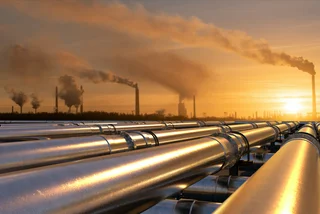Karpacz, Poland, Sept. 6 (ČTK) - The Czech Republic and Poland have renewed cooperation on the Stork II gas pipeline with both countries showing support for the project, Czech Prime Minister Petr Fiala told journalists at the Economic Forum in Karpacz Tuesday night following talks with Polish PM Mateusz Morawiecki.
Development of the Stork II pipeline, which would lead from the Czech border to Świnoujście in Poland, will enable further diversification of natural gas deliveries in Europe while reducing the reliance on Russian gas. The EU-backed plans for the pipeline were halted by former PM Andrej Babiš's administration in 2018.
Fiala and Morawiecki agreed that the completion of Stork II presents a solution to the current energy crisis and to the overall energy security of Central Europe.
"We agreed that it is necessary to find a European solution, that it is necessary to intervene in the energy prices so that they are acceptable for citizens and firms," Fiala said, adding that the current energy pricing structures need to change.
DÄ›kuji @MorawieckiM za pÅ™ivÃtánà na Ekonomickém fóru v Karpaczi. 🇵🇱 pic.twitter.com/OnOFxFU7ud
— Petr Fiala (@P_Fiala) September 6, 2022
"There are more variants that may be applied. We must definitely speak of some form of price ceilings," said Fiala, who believes that Friday's upcoming meeting of energy industry leaders from EU member states could produce that solution.
The PM called the project crucial to securing Czechia's future energy security.
The Stork II pipeline would lower reliance on Russian gas by connecting liquefied natural gas storage tanks in Świnoujście and the Croatian island of Krk. The first part, Stork I, connected Poland and Czechia in 2011, but only allowed for the flow of gas from Czechia to Poland, and not in the other direction.
The plan for the interconnection of the gas systems of Czechia, Hungary, Poland, and Slovakia first emerged during the Czech EU presidency in 2009.
"If the previous government had worked on the Stork II pipeline, our current situation would be different. Slovakia recently opened its interconnection with Poland and we are only at the beginning," Fiala said.
Babiš has previously dismissed Fiala's criticism saying the project failed to launch due to a lack of interest on Poland's part. Already in July, Fiala said Czechia is planning a direct interconnection with a gas pipeline from Poland.












 Reading time: 2 minutes
Reading time: 2 minutes 
























